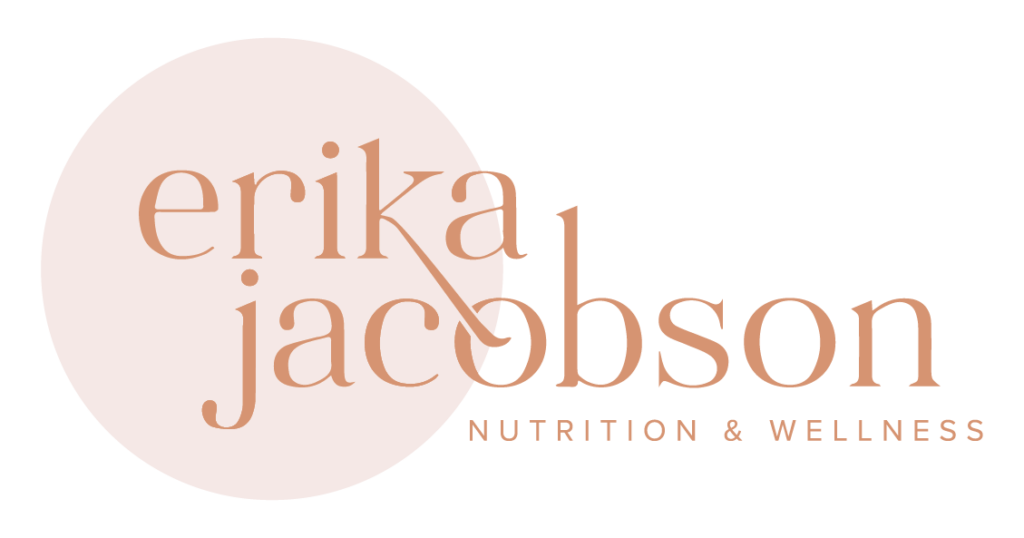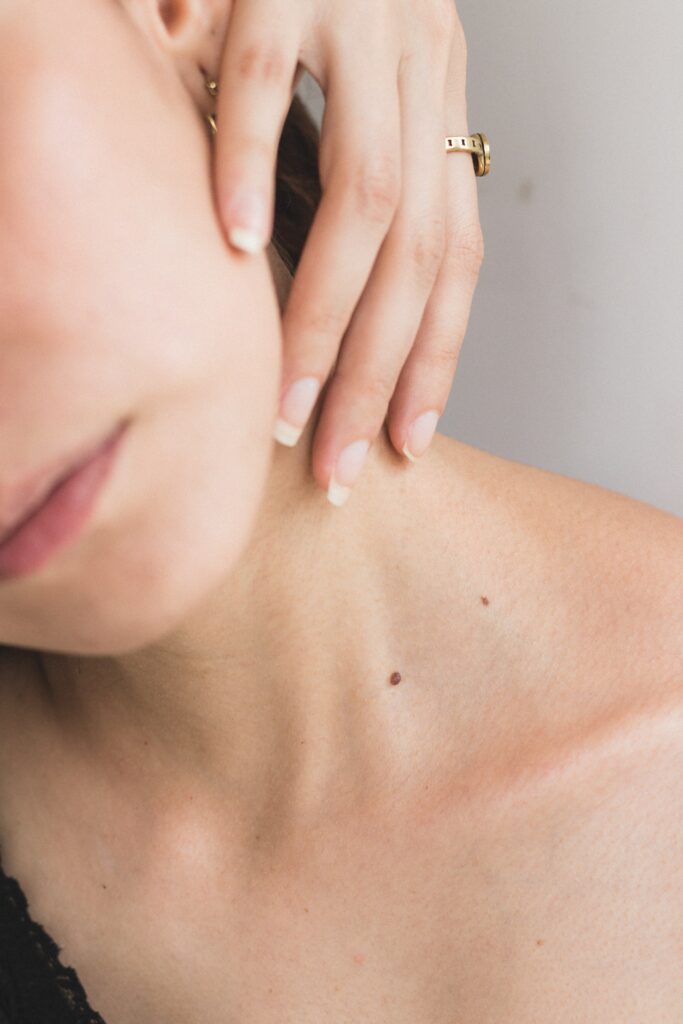When it comes to skin conditions such as acne, eczema, dermatitis, psoriasis, and rosacea, we often neglect the importance of what’s going on INSIDE. In this blog post, we will explore why good gut health is essential for clear skin and how working with a gut health dietitian can help!
It’s likely that your doctor never mentioned the gut-skin connection (I know mine didn’t!) because they’re focusing on symptomatic relief rather than uncovering the root cause. But in reality, the skin is a mirror of what is going on internally.
I visited dermatologists for years with no long-term solution in sight for my eczema and was only offered topical creams visit after visit.
Consequently, it was so frustrating because each time I stopped using the creams, my eczema came back with a vengeance. I knew there had to be a long term solution that actually gets to the root cause of my skin issues. It wasn’t until I implemented strategies to support the gut-skin connection that my eczema actually improved (without steroid creams). By doing so, I was able to focus on addressing the underlying issues rather than relying on temporary relief.
Why two seemingly unrelated body systems are very much connected:
-
-
Presence of inflammatory and dysbiotic aka “bad” bacteria and lack of beneficial bacteria is associated with development of various skin conditions.
-
An unhealthy immune system (did you know 70% of our immune cells live in our gut) and leaky intestinal barrier (leaky gut) can lead to the passage of bacteria and toxins that create an imbalance in the skin microbiome and lead to skin inflammation.
- Bacteria in the gut produce SCFAs (short chain fatty acids) that regulate inflammation.
- Poor gut absorption can lead to nutrient deficiencies (like vitamin A, vitamin D) that play a role in skin health.
The link between gut bacteria and skin conditions:
- E. coli in the gut is associated with atopic dermatitis and eczema.
- Presence of H. Pylori is associated with rosacea-like symptoms.
- Decrease in a phyla of bacteria called Firmicutes and increase in Bacteroides is associated with development of acne.
- The presence of Bifidobacterium in the gut is reduced in atopic dermatitis cases.
- Psoriasis patients have decreased levels of Akkermansia Muciniphilia, a keystone gut bacteria that supports a healthy gut lining.
- Treating SIBO (small intestinal bacterial overgrowth) in rosacea patients led to the improvement of skin symptoms, emphasizing the connection between the gut and skin.
How a functional dietitian specializing in gut health can support you in resolving your skin issues.
Identify Gut Imbalances:
- An essential step is to test for potential gut imbalances that may be contributing to your skin problems.
- A functional stool test is one of my favorite tools for this purpose. It provides valuable insights into gut immune function, bacterial imbalances, absorption issues, and the health of your intestinal barrier.
- This means that the connection between the gut and skin can be accurately assessed, leading to targeted treatment plans for skin conditions. If you want to learn more about stool testing, check out this blog post.
Restore Gut Health:
- Once we identify specific gut imbalances, we can develop a personalized supplement and nutrition plan to balance gut bacteria, calm down inflammation, optimize digestion and stomach acid levels, and heal the gut lining.
- I break down my process for gut restoration, in this blog post.
Implement a Whole Food Anti-Inflammatory Diet:
- Focusing on nutrient-dense, anti-inflammatory foods like vegetables, fruits, healthy fats, quality proteins, and whole food carbohydrates to support gut and skin health.
- It’s also essential to address potential food sensitivities that may be contributing to inflammation.
Principles of anti-inflammatory nutrition for skin health:
Increase Intake of Healthy Anti-Inflammatory Oils & Fats
- Focus on fatty fish, avocado, nuts, seeds, olives and olive oil
- Avoid trans-fat and refined seed oils
- A diet high in trans-fat can actually increase the presence of harmful gut bacteria that contribute to skin conditions.
- Refined oils such as soybean, sunflower, canola, corn and vegetables can increase gut inflammation as well as skin inflammation.
Limit Alcohol Intake
- Alcohol can increase skin inflammation and delay wound healing
Increase Fiber Intake
- Dietary fiber is essential to increase populations of healthy gut bacteria.
- SCFA (short chain fatty acids) are metabolites produced by bacterial fermentation of fiber. They support the gut lining, immune health, regulate inflammation and prevent the overgrowth of harmful bacteria on the skin.
- Learn how to support your gut microbiome and increase fiber diversity, in this blog post.
Consume Probiotics & Prebiotics
- Both in food and supplement form can support the gut-skin connection.
- Probiotics provide beneficial bacteria that help to support a healthy balance of gut bacteria, modulate the immune system, and regulate inflammation.
- Cottage cheese, aged cheese, yogurt, kefir, kombucha
- Fermented vegetables, kimchi, sauerkraut
- Prebiotics provide fuel for good gut bacteria to flourish.
- Apples, asparagus, garlic, flaxseeds, onion, peas, whole grains, legumes
Optimize Nutrient & Mineral Status
- Nutrients like glutamine, omega 3 fatty acids, selenium, zinc and vitamin A play a significant role in skin health and are often deficient in people with skin issues.
I hope you can see why it’s so important to start treating skin issues from a holistic/whole body approach rather than simply a skin problem.
By working with a functional gut health dietitian, you can uncover any gut imbalances that may be contributing to your skin issues and address them naturally. This may involve balancing gut bacteria, healing the gut lining, implementing an anti-inflammatory diet, and optimizing your nutrient and mineral status.
Want to chat with me about how my process can help you heal your gut AND skin? Book a root cause clarity call with me!
- Mahmud, M. R., Akter, S., Tamanna, S. K., Mazumder, L., Esti, I. Z., Banerjee, S., Akter, S., Hasan, M. R., Acharjee, M., Hossain, M. S., & Pirttilä, A. M. (2022). Impact of gut microbiome on skin health: Gut-skin axis observed through the lenses of Therapeutics and skin diseases. Gut microbes. https://www.ncbi.nlm.nih.gov/pmc/articles/PMC9311318/
- Mann, E. A., Bae, E., Kostyuchek, D., Chung, H. J., & McGee, J. S. (2020, August). The gut microbiome: Human health and inflammatory skin diseases. Annals of dermatology. https://www.ncbi.nlm.nih.gov/pmc/articles/PMC7992658/




